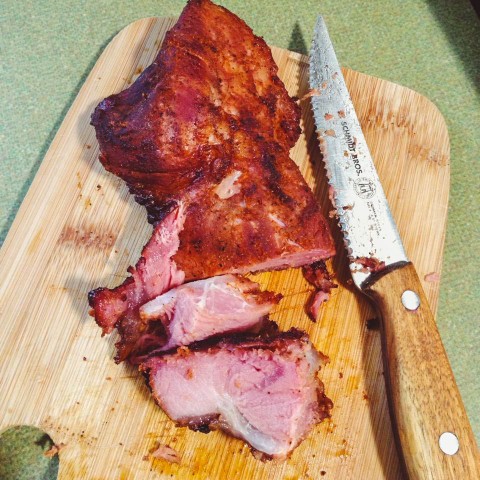In the last minutes of sleep, Nick dreamed a bear crawled out of his mouth and he woke up scratching at his beard, unsure whether he feared birth or death. He reached below the bed where yesterday’s checkered chef pants were still in a heap on the floor and pulled them on even though he wasn’t a chef. He worked at the deli in the supermarket.
Folding back the thick plastic wrappers, Nick turned roasted breasts of birds and hocks of pigs into neatly stacked slices. Since most people ordered at the new self-checkout kiosk, he hardly ever winked at grandmas or made small talk with new dads. His day was mostly spent quietly rocking the slicer back and forth, its blade so sharp it turned pastrami into stained glass when held up to the light. The clash of softness against metal felt both desecrating and sacred.
When Nick’s sister Amy was born she had a hole in her heart and so she spent much of their childhood in the hospital. For long stretches of time their mother slept at the hospital while his father came home to Nick, made him macaroni and cheese from a box and topped it with sliced hotdogs arranged in a smile. The sky would turn lavender and then a deeper purple, a bruising in reverse, and Nick and his father would sleep curled in his bed with the television on.
Amy came home from the hospital tiny, with a knotty scar on her chest that they all called a zipper. When they got older, Amy leaned on him as they watched You Can’t Do That on Television. She touched her zipper when she laughed, as if she were making sure it stayed closed. She liked when the actors said “I don’t know” and slime poured from the ceiling; he liked the skits where the cast stood in front of an off-camera firing squad but tricked the military officer into commanding fire on himself.
Nick turned those skits into his own game. By gripping the trim around the stairwell as if it were a branch, he could rest his feet on the stairs and wait like a great blue heron until Amy walked by. He’d shout “Ready Aim Fire,” only the “Ready Aim” part came out as a question, a pun on her name. She’d walk past the doorway as he said “Fire” and he’d shoot his legs forward as if to kick her, though of course he never did. Their mother would say, “Don’t hang from the trim like some kind of animal,” as she handed him a Windex-sprayed rag to wipe his fingerprints from the wall.
At the end of his shift, Nick cleaned the translucent blood from the counters, put the meat in the cooler and greased the slicer before grabbing the two sacks of trash and carrying them to the dumpster. Outside he heard a clanging like broken bells and something like grunting, as if someone were shoveling snow at a church, but it was late summer and there wasn’t even a breeze. Nick dropped the bags at the edge of the asphalt where a curb should be but where there was only the end of pavement and grass that had gone to seed.
A pool of light from an open car door backlit the man who was not holding a shovel but a pipe and who wasn’t hitting a bell but a woman who lay in the grass covering her head with her arms. Amy died when Nick was twelve, not because of the hole in her heart, but because of an infection after surgery, and when she died Nick felt like he had a hole in his heart, too. He stopped eating meat when he took the job at the deli. He couldn’t handle the heft of it all.
A moth flitted around the rearview mirror of the open car and Nick yelled “Help” and “Stop” as he put his body between the man with the pipe and the woman at his feet. Above him, he noticed the stars looked less like stars and more like an absence of sky.



